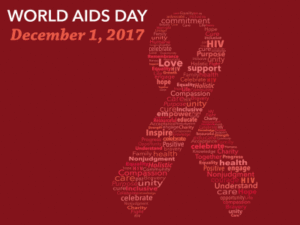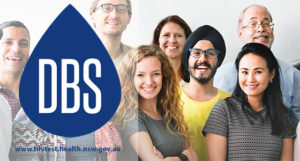World AIDS Day on 1 December
In the week leading up to World AIDS Day on 1 December, health professionals including GPs across NSW are encouraging people ‘at risk’ of HIV to be tested. It is important for your patients to know that it has never been easier to get tested. There is now a mix of high quality, safe and innovative HIV testing services available, with express and drop-in clinics offering faster results, and after-hours service. HIV testing is fast, free and confidential.
The latest HIV data report shows a steady decline over the past 12 months for gay and bisexual men, reporting 40% fewer new HIV infections in NSW this year. A total of 101 gay and bisexual men were diagnosed with HIV in the period of January–June 2017, the lowest count since HIV surveillance began in 1985. Earlier HIV treatment initiation, high rates of treatment in people with HIV, earlier diagnosis through more frequent and coverage of testing, and high uptake of pre-exposure prophylaxis (PrEP) for HIV prevention are all contributing to this success. However, the number of people newly diagnosed with evidence of late diagnosis remained stable. Diagnoses among gay and bisexual men who were born overseas and heterosexuals have not declined.
One in six people diagnosed with HIV in NSW report heterosexual exposure, and at least 10 per cent of people with HIV do not know they have the virus and could unknowing pass the virus onto others. Late diagnoses show there is still a pool of people with undiagnosed HIV in our communities.
In addition to encouraging gay and homosexually active men to continue regular testing, health professionals including GPs should encourage the following groups to get a test:
• Heterosexual men and women with behaviours putting them at risk of HIV e.g. men who identify as heterosexual but who have sex with men, people who inject drugs
• Gay and bisexual men who were born overseas
• People from countries where there are high rates of HIV and people who have had unprotected sex while travelling.
Peak professional bodies such as The Royal Australian College of General Practitioners; Australian College of Rural and Remote Medicine and Australian Primary Health Care Nurses Association support the campaign for more HIV testing among a diverse range of patient groups.
EPIC Trial
Pre-exposure prophylaxis (PrEP) using Truvada is highly effective in preventing HIV infection. The Expanded PrEP Implementation in Communities (EPIC) in NSW trial being conducted by the Kirby Institute, University of New South Wales (UNSW) in collaboration with partners, to assess the feasibility and impact of rapid rollout of PrEP on a large scale targeting gay men with HIV high risk behaviour. It commenced on 1st March 2016 and so far more 7,300 participants are recruited across 22 sites. As PrEP for HIV becomes more available, GPs are well-placed to respond and prescribe – GPs and nurses do not need to be experts in HIV management but to be prepared and supported to deal with sexual health needs and testing or screening for STIs. If you would like to know more, please visit EPIC-NSW epic-nswstudy.org.au.
Dried Blood Spot (DBS) HIV home testing kit

The HIV home testing kit, Dried Blood Spot (DBS) HIV test, makes testing easy, reliable and convenient by allowing individuals to order a free self-sampling kit online, take their own sample in the privacy of their home and send it to a laboratory for testing and results management. The free testing kit can be ordered at hivtest.health.nsw.gov.au.
Earlier HIV Treatment Initiation
HIV treatment allows most people with HIV to lead long and productive lives, and can also prevent HIV transmission. Evidence shows that current HIV treatments are much simpler, well tolerated and effective. There is now compelling evidence which shows that starting treatment earlier after diagnosis improves health outcomes. For more information, please visit health.nsw.gov.au/endinghiv.
HIV Support Program (HSP)
The NSW HIV Support Program ensures that expert advice, support and resources needed by doctors to deliver the 5 Key Support Services are available at the time of making an HIV diagnosis. The 5 key support services are 1) Effective clinical management, including access to treatment; 2) Psychosocial support; 3) Counselling about prevention of transmission of HIV to others, including the role of treatment in reducing the risk of transmission: 4) Support to ensure that all at risk partners are identified and tested for HIV: 5) Linkage to relevant specialist, community and peer support services. For more information, please visit health.nsw.gov.au/endinghiv/Pages/support-program.aspx.
For confidential information on HIV or where to get a HIV test, please call the NSW Sexual Health Infolink on 1800 451 624 or visit shil.nsw.gov.au.
